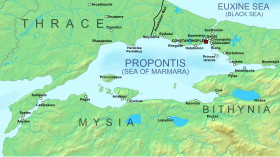Siege of Constantinople (674-678)
| First Arab Siege of Constantinople | |||||||
|---|---|---|---|---|---|---|---|
| Part of the Arab–Byzantine Wars | |||||||
 Map of the environs of Constantinople in Byzantine times |
|||||||
|
|||||||
| Belligerents | |||||||
| Byzantine Empire | Umayyad Caliphate | ||||||
| Commanders and leaders | |||||||
| Constantine IV |
Yazid I Sufyan ibn 'Awf Gunada ibn Abu Umayya Fadhala ibn 'Ubayd |
||||||
The First Arab Siege of Constantinople in 674–678 was a major conflict of the Arab–Byzantine Wars, and the first culmination of the Umayyad Caliphate's expansionist strategy towards the Byzantine Empire, led by Caliph Mu'awiya I. Mu'awiya, who had emerged in 661 as the ruler of the Muslim Arab empire following a civil war, renewed aggressive warfare against Byzantium after a lapse of some years and hoped to deliver a lethal blow by capturing the Byzantine capital, Constantinople.
As reported by the Byzantine chronicler Theophanes the Confessor, the Arab attack was methodical: in 672–673 Arab fleets secured bases along the coasts of Asia Minor, and then proceeded to install a loose blockade around Constantinople. They used the peninsula of Cyzicus near the city as a base to spend the winter, and returned every spring to launch attacks against the city's fortifications. Finally, the Byzantines, under Emperor Constantine IV, managed to destroy the Arab navy using a new invention, the liquid incendiary substance known as Greek fire. The Arab land army in Asia Minor was also defeated by the Byzantines, forcing the Arabs to lift the siege. The Byzantine victory was of major importance for the survival of the Byzantine state, as the Arab threat receded for a time. A peace treaty was signed soon after, and following the outbreak of another Muslim civil war, the Byzantines even experienced a period of ascendancy over the Caliphate.
The siege left several traces in the legends of the nascent Muslim world, although it is conflated with accounts of another expedition against the city a few years previously, led by the future Caliph Yazid I. As a result, the veracity of Theophanes's account has been questioned by recent scholarship, which places more emphasis on the Arabic and Syriac sources.
...
Wikipedia
